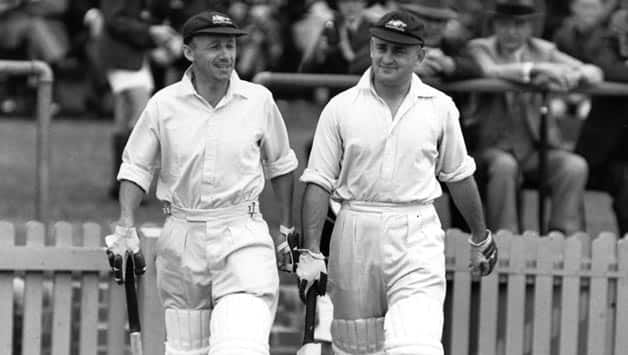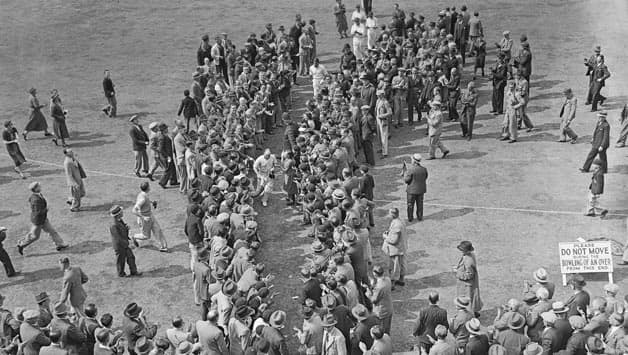Skills
Snitch
- Joined
- Jan 17, 2012
- Messages
- 43,185
Yet you picked him Mr Engineer
I picked him for the sake of the caf Indians. Poor guys never even won the test world cup (a.k.a. The Ashes). At least he can win this test draft.
Yet you picked him Mr Engineer
That was the same reason Marun picked him too. You really should have gone with a bowler mate. My vote would have been for you had you smuggled in Garner or Trueman or anyone really.I picked him for the sake of the caf Indians. Poor guys never even won the test world cup (a.k.a. The Ashes). At least he can win this test draft.
Yeah, that would have looked more favourable, but obviously his openers would probably be shredded to pieces by Aldo in the thread. And if he had replaced Willis with Garner, Trueman, would have been even more sweeter.Garner Mcgrath Steyn Willis and Swann as 5 bowlers with the spinner available to use any help in the 4th innings. 6 batters with him batting first. Looks much better to me.
I agree, a final should have at least one specialist spinner. However, dunno about his reasons but for me it was mainly once I got Holding with Roberts I wanted to give the attack a bit more of a look to what they are more used to, I raised this earlier as well in regards to the likes of Holding and Garner that since they performed in a pack of 4, it's difficult to judge what they would have done had they been a sole leader of the attack like Hadlee for example, but here they are in their element, supported by pace like they were and that should bring out their best.Agreed. If it does come to it, Tallon and Pollock at 7-8 are a slightly better bet than his 7-8. Might come in handy in the 4th Innings if it comes to it.
I did wish each team had atleast one spinner though. This all out pace attack from each sides does some injustice to the spinners.
His openers were going to be weaker than Aldos regardless. His middle order makes up for it. Now add to it having an extra specialist bowler and it'd advantage skills. Someone like Cairns contributes too little which is why I'd have subbed him off over Willis even though Willis obviously isn't a Garner.Yeah, that would have looked more favourable, but obviously his openers would probably be shredded to pieces by Aldo in the thread. And if he had replaced Willis with Garner, Trueman, would have been even more sweeter.
You can not reliably assume that Cairns will get wickets as you can do for Steyn and Mcgrath. Or that Shaun Pollock would get Sehwag out early.He still would have struggled with the bowling imo. Cairns atleast will add something with the ball. He is an intelligent bowler, has some good variety. Any swing, and he will relish it. Has a good slower one on him too if I am not mistaken.
Yep, you need someone who can play the role of stock bowler in every attack. Without spinners, that becomes even more crucial.On the other hand you have Steyn, and Cairns, neither of whom can bowl similarly long tireless spells and that just puts additional unnecessary concern on the captain constantly having to think about their fitness.
I know this is a game on paper where things like these don't get talked about but in a real game having the sort of balance that I have provided in my bowling unit is vital and you'd see less talented bowlers getting picked for the sheer fact that they would be able to do the dirty work.
Lol. I am not assuming anything, but I wouldn't be surprised if he had picked up a couple. He has it in him to deliver that.You can not reliably assume that Cairns will get wickets as you can do for Steyn and Mcgrath. Or that Shaun Pollock would get Sehwag out early.
I understand Aldo's point, but I thought Qadir in for Bedser would have have given more balance to Aldo's team. I'd rate Qadir as being more likely to pick up important partnership wickets than Bedser. I'm not sure how the likes of Border, Chappell would fare against spin though.Yep, you need someone who can play the role of stock bowler in every attack. Without spinners, that becomes even more crucial.
Sachin loves him.Lol. I am not assuming anything, but I wouldn't be surprised if he had picked up a couple. He has it in him to deliver that.
I understand Aldo's point, but I thought Qadir in for Bedser would have have given more balance to Aldo's team. I'd rate Qadir as being more likely to pick up important partnership wickets than Bedser. I'm not sure how the likes of Border, Chappell would fare against spin though.
Specifically why I avoided his name at all costsSachin loves him.
Sir Leonard Hutton: I knew him well. It would be hard to think of a greater Australian batsman. He had qualities that even Bradman hadn't got. I always liked to watch him bat and he was a most likeable fellow.




Specifically why I avoided his name at all costs
Abdul Qadir
The game was being played in the festive spirit. I had just bowled a maiden to Krishnamachari Srikkanth and I went to Sachin, who was the non-striker, and told him that when I bowled him the next over he shouldn't treat me as Abdul Qadir, but just as any other bowler from his galli or school, and go for his shots, as that would be good for his future. He was just a young boy then and I wanted to give him confidence.
He just smiled at me and didn't say anything. Next over when I came on to bowl to him, he stepped out to hit the first ball for six over long-off. He was dropped at midwicket later in that over as he tried for another big one, but he managed three more sixes. It wasn't like I was just feeding him: I was trying my best to get him out, but he was just so talented that he gave me no chance.
Interviewed by Nagraj Gollapudi.
Sachin Tendulkar
When I came in to bat we needed 69 runs in five overs or so. I had a go at Mushtaq Ahmed who had taken two wickets and hit him for a couple of sixes. Qadir then came up to me said, "Bachchon ko kyon mar rahe ho? Hamein bhi maar dikhao" ("Why are you only hitting the kid? Hit me too.") Qadir was a great bowler and I was only playing my first series. I didn't say anything, but it fired me up. I took up the challenge and gave it a go. Ultimately we fell short only by four runs.
 That bowler had the entire world in awe of his pace and movement, yet this guy, completely unfazed and went on to perform well, and apart from Bradman the only man to get credit in that bodyline series.
That bowler had the entire world in awe of his pace and movement, yet this guy, completely unfazed and went on to perform well, and apart from Bradman the only man to get credit in that bodyline series. And McCabe did. He continued to respond to the blitzkrieg with a volley of fiery strokes of his own. He was still undefeated, on a grand 187, when the innings came to an end. The runs had come in just about four hours off 233 balls, with as many as 25 boundaries. It still stands as perhaps the greatest innings ever played against hostile bowling. Australia ended at 360.
Mate already voted for you.@Mani @Varun @NM @Akshay @Spoony @harshad and others (can only tag 5) I know you lads like romanticising about the past legends so have a read.
I didn't post it just to show he was a good batsman, his ability, gracefulness, attacking stroke play etc is widely known, what those incidents show more than anything is character. Character needed to rise above the greats and stamp your authority.
Who else comments about Harold Larwood saying things like “Don’t worry about him [Larwood]. He’s not as fast as he looks; I’ll handle him.”.That bowler had the entire world in awe of his pace and movement, yet this guy, completely unfazed and went on to perform well, and apart from Bradman the only man to get credit in that bodyline series.
The likes of G Chappell are revered a lot due to the fact that they made their runs against tough bowlers - well here we have someone who did precisely that, with arguably even more attractive display of batting. And it garnered praise from top minds in cricket like:
Neville Cardus could seldom speak of him without drawing comparisons with the great Victor Trumper. “Genial, friendly, Stan was Australia’s most gallant and knightly batsman since Victor Trumper. In his brilliant strokeplay there was certain courtliness. In his most aggressive innings, there was no brutality; his bat was never used as a bludgeon.”
The slightly more sedate E. W. Swanton observed that McCabe was from “the heroic mould … like those of Hobbs, Macartney and [Frank] Woolley essentially qualitative …(he) came as near as any player to one’s conception of the perfect cricketer.”
Concentrate on the word heroic. You can get quality batsmen, with loads of averages and credentials but it takes something to be called a hero.
In Lara, Hobbs, Headley and McCabe I have FOUR such characters, people who stood up time and again against the most hostile conditions and delivered. All four are incredibly respected throughout the world for their class and grace, they were leaders of men, true gentlemen and ones who would influence the game both on and off the pitch, such was their charisma.
It is what matters in a great game like this more than anything. These people will deliver, simple as that.
A man of fine taste, I must say.Mate already voted for you.
Brings back some memories.Overall, I rate Skills' team's batting higher but voted Aldo as I think Holding and Roberts will be difference makers. As a group, Skills' attack look fantastic but except McGrath, none of them had any special impact in Australia.
If I win it will be my second overall individual draft win on redcafe, third win in which I was directly involved and first in a cricket draft after losing out in a final earlier, so I'm pretty excited.Aldo slowly building up his innings vote by vote. Can Steyn come in and deliver a beauty ?
Btw, what does the Winner get ? Don't say a Kenwood Juicer
Congrats Aldo.
I had the idea of getting 4 people to change their votes to skills in the last 15mins to give you a heart attack but then got caught up with something else
 You are playing with peoples' lives here man!
You are playing with peoples' lives here man!I get what you mean, the Lara pick was the game changer for mean. Came at the perfect time when I needed that star power in batting and someone who's universally acclaimed and needs no familiarising with.Congratulations Aldo! Some very astute picks in the reinforcement rounds fixed your team's 'weak' points (although I know you didn't see it that way).
Congrats @Aldo you could win two simultaneous drafts perhaps
Nice to see the effort you put in rewardedyou were only 4 posts off equalling Skills posts from every one of his matches combined
a whopping 25
 A man a few words, is Skills.
A man a few words, is Skills.